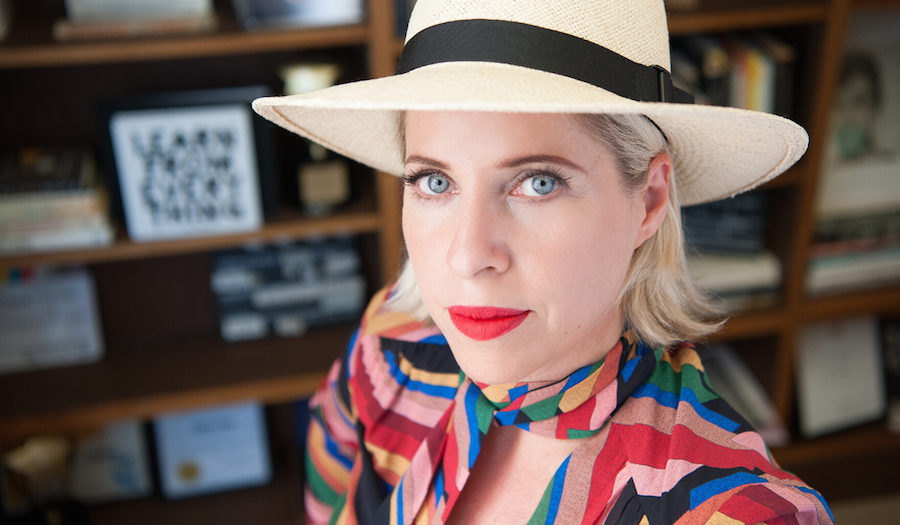Internet Pioneer Tiffany Shlain Has The Digital Detox Method You Can Actually Stick With

Tiffany Shlain, an Emmy-nominated filmmaker and creator of the Webby Awards, says she finds it liberating to disconnect from her devices one day a week. This practice, which she’s done for nearly a decade with her husband and kids, has completely changed their lives, giving them more time, productivity, connection, and presence. In her newly released book 24/6: The Power of Unplugging One Day A Week, Shlain takes us on an interesting and entertaining journey through time and technology, introducing a strategy for living in our 24/7 world: turning off all screens for twenty-four hours each week.
1. You are the founder of the Webby Awards, co-founder of the International Academy for Digital Arts and Sciences, and a renowned filmmaker. It’s safe to say technology is a big part of your daily life. In "24/6," you urge people to reclaim their time by spending 24 hours a week disconnected. How difficult was that for you personally?
It wasn’t difficult at all–I actually found it liberating. What excited me about the web in the early days was that it was this decentralized network that connected people and ideas in all these new ways, but when the smartphone came out, and the business model changed to glue our eyes to the screens and keep us on one scroll, I got sucked in like everyone else, and wasn’t paying attention to the people and things that mattered most to me.
When I started unplugging one day every week with my family, I got all that back. So it’s not what I’ve lost, but what I’ve gained. On my screen-free day, I feel so much more present, and afterward, I’m much more productive. It’s my whole family’s favorite day of the week.
2. You and your family refer to your day of unplugging from screens as your “Tech Shabbat.” Can you speak to the cultural significance of this name?
Although I’m a cultural Jew, not a religious one, I see great value in the ancient practice of taking a full day of rest. Many other cultures have a version of this, but somehow, we’ve lost it. In our 24/7 society, a sabbath is seen as only for the very religious. It should be for everyone! I like the term Tech Shabbat, and I think it works for people from any background. It’s like yoga, and meditation, a practice that enhances your life even if you’re from a different culture.
3. What was the Aha! Moment when you realized you needed to change the way you were spending your time?
In a period of days, I lost my father and my husband’s father, and my daughter was born, and it felt like life was grabbing me by the shoulders and saying “focus on what’s important!” I lost my father to brain cancer. The fact that my father died from brain cancer put an acute focus on attention, and eye contact, and being present.
4. Your daughters (ages 16 and 10) have spent most, if not all, of their lives practicing a day without screens each week. How does their experience differ from their peers? Are they aware of the differences? What’s their reaction to your “Tech Shabbats”?
It’s so surprising to people that our daughters love this, especially our teen. But always being “on” 24/7 isn’t good for anyone of any age, and when you realize what it’s like to be fully unplugged, you see how it makes you feel so much better and ultimately resets you. Because they have a different perspective than I do, they speak for themselves in my book, which I hope is useful for other families to read.
5. What do you think is the most challenging part of following through a weekly ritual such as this? What are some of your tips for sticking with it?
Having done this for ten years, we’ve figured out all the tricks to get the most of the day, and I share them all in the book. A couple here are: do this practice with someone else. It’s always good to do things with other people, whether it’s a friend, your partner, or your kids — doing things communally helps hold you to it. Also, on Friday nights I turn off my phone and put it away. Out of sight, out of mind. We have a landline if someone needs to call. I would recommend that too. I feel set free for that one day a week of being “on” and available to everyone and everything. I think we have forgotten how good that can feel. I also write in the book about a lot of things you can do the other six days to bring more balance back. We have weekly challenges to help people lead up to doing a Tech Shabbat that people can find at 24Sixlife.com. Ultimately, Tech Shabbat will become your favorite day of the week. The biggest thing I would propose is to ask yourself or anyone you want to do this practice with you is this “What do you wish you had more time to do?” then fill the day with that — even if that’s just doing nothing. Our minds need that fallow state too– for creativity, productivity after that time off and for overall well being. Every wisdom practice talks about the importance of stillness and quiet. Having this one day each week, without all the digital noise, will let you feel the power of that state of being.
For more info, go to 24SixLife.com. Follow Tiffany on Twitter, Facebook & Instagram
This Q&A was featured in the November 10th edition of The Sunday Paper. The Sunday Paper inspires hearts and minds to rise above the noise. To get The Sunday Paper delivered to your inbox each Sunday morning for free, click here to subscribe.


